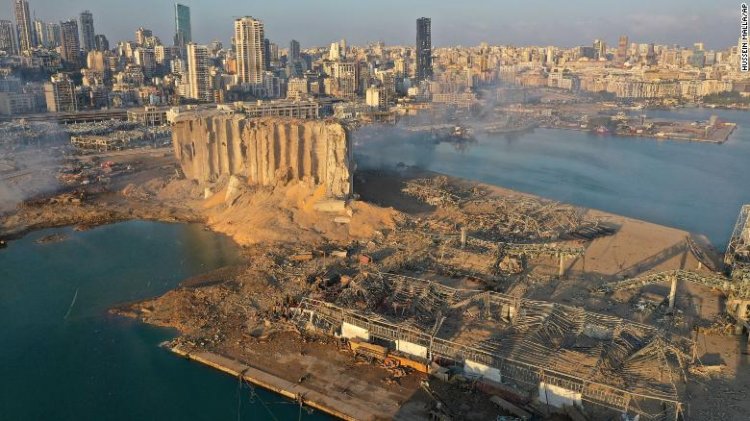In the leadup to its anniversary my colleagues and I have had to pore over hours of video of the explosion and its aftermath. It's not an easy task.
I was at my desk in CNN's Beirut bureau, contemplating what to do after work on a hot August evening, when I felt the building shake.
An earthquake, I thought.
As I crouched down to take cover, I heard a huge explosion, followed by a tide of shattering glass.
I stumbled from room to room in a daze, stepping over twisted aluminum window frames, cables, chairs and broken equipment.
Was it a car bomb? I asked myself. An airstrike?
I looked outside and saw a strange orange-red cloud floating overheard. Below in the street, car alarms were squawking in a cacophonous chorus, the air full of dust, people were running around, shouting in confusion.
I called CNN producer Ghazi Balkiz. He answered, only to say he was OK but that was it.
Next, I tried calling our cameraman, Richard Harlow. No answer. I called again and again. Still no answer. Richard eventually made it back to the office, his right hand a bloody mess, and a gaping wound in his leg which he only discovered hours later, numbed by the shock and adrenalin of the moment.
Ghazi showed up later, after he'd taken his wife Sally to a chaotic hospital to be treated for multiple wounds caused by flying glass. The scenes from that hospital, he said, were worse than any he had seen covering the wars in Syria and Iraq.
Everyone who survived the events of August 4, 2020, in Beirut vividly recalls the shock, bewilderment and confusion they felt in the moments after the blast.
Since then, those emotions have been replaced by others -- anger, rage and resentment -- that the dangerous ingredients that caused it had lain so close to the heart of this bustling city for more than six years.
One year ago, at 6.08 p.m. on an otherwise unremarkable Tuesday, they detonated in a mushroom cloud of death and destruction -- one of the largest non-nuclear blasts in history.
Since then, Lebanon has plummeted even deeper into an abyss of economic and financial oblivion, political paralysis, and despair which it had begun sinking into long before the explosion.
For those who lost loved ones, the blast, and their demands for justice and accountability, remain a constant.
On a hot, humid afternoon in late July, Elias Maalouf stands outside the Justice Ministry in Beirut holding up a photograph of his son, George, in military uniform.
George was killed when hundreds of tonnes of ammonium nitrate, stored in the port since it was confiscated in 2013, exploded leaving a 400-foot wide crater and a trail of destruction spreading more than 10 kilometers (6 miles) from the epicenter of the blast.
"Every day his mother cries and cries," said Maalouf. "She asks, 'Why doesn't George come over for coffee? Why doesn't he come over for the weekend?'"
George, 32, was engaged to be married. "I wanted him to fill our house with grandchildren," his father said.
Maalouf says he searched for eleven days to find his son's body.
He and the families of many of the others who died have gathered regularly to demand justice for the more than 200 people killed in the blast but, a year on, it remains elusive.

